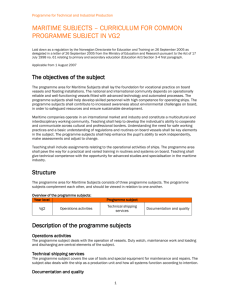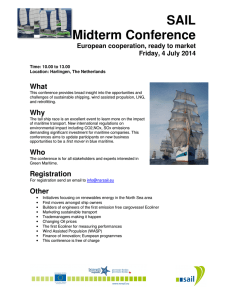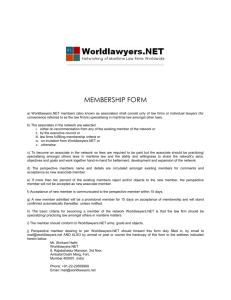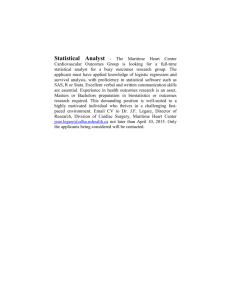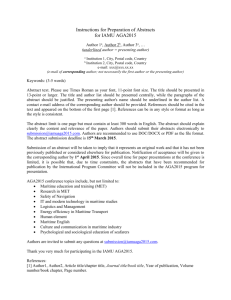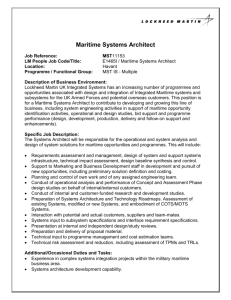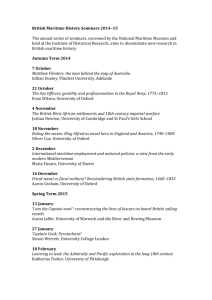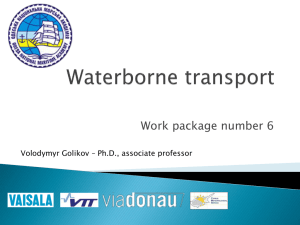Maritime Subjects - Curriculum for common programme subject in Vg2
advertisement
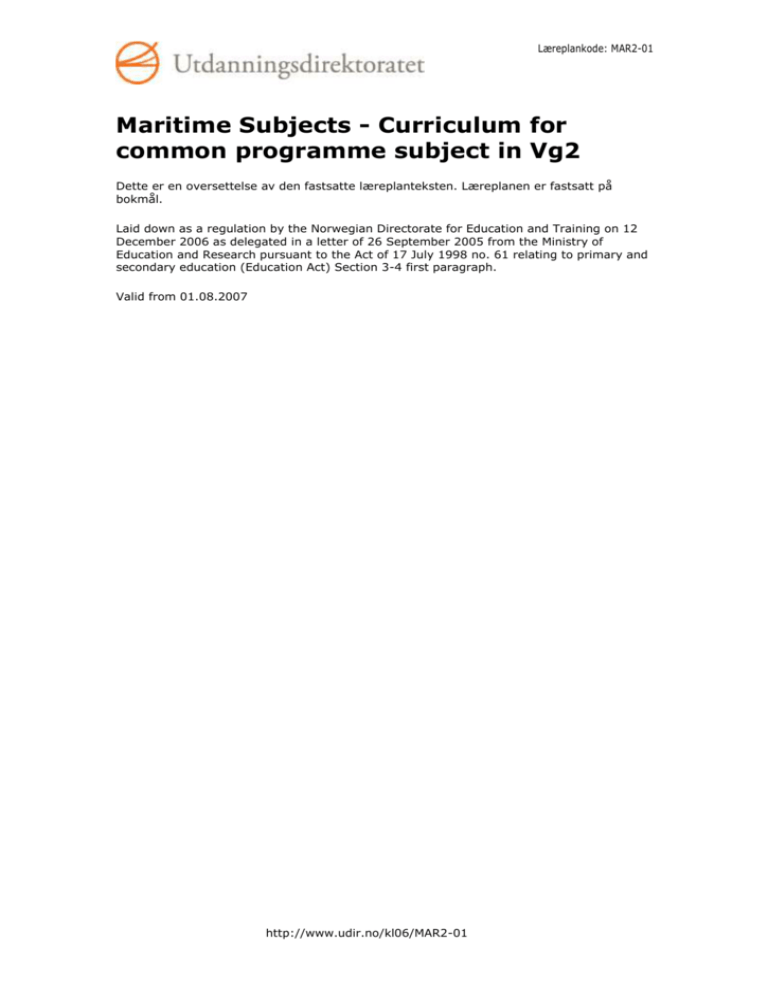
Læreplankode: MAR2-01 Maritime Subjects - Curriculum for common programme subject in Vg2 Dette er en oversettelse av den fastsatte læreplanteksten. Læreplanen er fastsatt på bokmål. Laid down as a regulation by the Norwegian Directorate for Education and Training on 12 December 2006 as delegated in a letter of 26 September 2005 from the Ministry of Education and Research pursuant to the Act of 17 July 1998 no. 61 relating to primary and secondary education (Education Act) Section 3-4 first paragraph. Valid from 01.08.2007 http://www.udir.no/kl06/MAR2-01 Programområde for maritime fag - Læreplan i felles programfag Vg2 Læreplankode: MAR2-01 Purpose The programme area for Maritime Subjects shall lay the foundation for vocational practice on board vessels and floating installations. The national and international community depends on operationally reliable and well-functioning vessels fitted with advanced technology and automated processes. The programme subjects shall help develop skilled personnel with high competence for operating ships. The programme subjects shall contribute to increased awareness about environmental challenges on board, in order to safeguard resources and ensure sustainable development. Maritime companies operate in an international market and industry and constitute a multicultural and interdisciplinary working community. Teaching shall help to develop the individual’s ability to cooperate and communicate across cultural and professional borders. Understanding the need for safe working practices and a basic understanding of regulations and routines on board vessels shall be key elements in the subject. The programme subjects shall help enhance the pupil’s ability to work independently, make assessments and adjust to change. Teaching shall include assignments relating to the operational activities of ships. The programme area shall pave the way for a practical and varied training in routines and systems on board. Teaching shall give technical competence with the opportunity for advanced studies and specialisation in the maritime industry. Structure The programme area for Maritime Subjects consists of three programme subjects. The programme subjects complement each other, and should be viewed in relation to one another. Overview of the programme subjects: Year level Programme subject Vg2 Operations activities Technical shipping services Documentation and quality Description of the programme subjects Operations activities The programme subject deals with the operation of vessels. Duty watch, maintenance work and loading and discharging are central elements of the subject. Technical shipping services The programme subject covers the use of tools and special equipment for maintenance and repairs. The subject also deals with the ship as a production unit and how all systems function according to intention Side 2 av 5 Programområde for maritime fag - Læreplan i felles programfag Vg2 Læreplankode: MAR2-01 Documentation and quality The programme subject covers the use of routines and systems as a basis for operational and technical service. It also deals with national and international bodies that steer the maritime industry. The programme subject covers environment, health and safety regulations and how harmful discharges and emissions can be prevented. Emergency procedures, registration, non-conformance reporting and safety training form part of the subject. Teaching hours Teaching hours are given in 60-minute units. Vg2 Operations activities 167 teaching hours per year Technical shipping services 160 teaching hours per year Documentation and quality 150 teaching hours per year Basic skills Basic skills are integrated into the competence aims for this course in areas where they contribute to the development of and are part of the subject competence. In Maritime Subjects, basic skills are understood as follows: Being able to express oneself orally and in writing in Maritime Subjects involves describing, explaining and documenting the assignments in Norwegian and English. It also means being able to articulate, orally and in writing, risk assessments and non-conformance reports. In addition, it involves being able to use precise language in order to avoid errors and misunderstandings. Being able to read in Maritime Subjects involves understanding and following work specifications, procedures, manuals and standards in Norwegian and English. In addition, it means being able to understand relevant regulations. Numeracy in Maritime Subjects involves configuring machines and calculating pressure, temperature and mixture ratios in fluids and gases. It also involves being able to calculate sailing time and distance. Digital literacy in Maritime Subjects involves using digital tools for planning, operational, documentation and communication purposes. Digital equipment is also used for monitoring, fault-finding and calibrating machines and equipment. Competence aims Operations activities The aims of the studies are to enable pupils to Side 3 av 5 Programområde for maritime fag - Læreplan i felles programfag Vg2 Læreplankode: MAR2-01 plan and execute assignments involving noise levels carry out duty watch in accordance with fixed guidelines strop and hook up cargo and signal the crane driver in accordance with current regulations and standards use permanently mounted lifting equipment and tackle in a safe manner describe methods for handling and securing cargo explain the use of emergency power generators, fire pumps and emergency drain pumps explain the use of mooring and anchoring equipment use ropes and wires in a safe manner use an electronic maintenance system and record maintenance work in English and Norwegian use personal protective equipment and personal protective techniques describe onboard emergency functions Technical shipping services The aims of the studies are to enable pupils to elaborate on the vessel’s construction and explain factors that affect stability describe the basic principles of navigation and perform simpler navigational calculations explain the impact of weather on a ship’s schedule describe how the ship’s technical systems function and carry out basic technical calculations use welding and gas equipment to make repairs to the deck and machinery use manual tools, instruments and equipment for service and maintenance on electrical and mechanical installations describe methods and techniques for treating different material surfaces on board plan and implement ship’s cleaning use ergonomically correct working methods and positions Documentation and quality The aims of the studies are to enable pupils to describe onboard safety and emergency systems carry out work in line with regulations concerning working environment, health and safety elaborate on laws and guidelines that deal with intoxicants on board the ship describe how waste should be managed and how to prevent harmful discharges and emissions elaborate on relevant laws, regulations and conventions that apply to the assignments use paper-based and electronic notice boards in English and Norwegian to support daily routines describe the main functions of the crew on board a ship elaborate on the principles in a quality assurance system assess their own work in relation to job orders, drawings, costs and standards explain the significance of the ISM and ISPS codes for operational safety document training completed in accordance with IMO 60 Assessment Vg2 Maritime subjects Provisions for final assessment: Side 4 av 5 Programområde for maritime fag - Læreplan i felles programfag Vg2 Læreplankode: MAR2-01 Overall achievement marks Programme subject Provisions Operations activities Technical shipping services The pupil shall have an overall achievement mark in each programme subject. Documentation and quality Examination for pupils Programme subject Provisions Operations activities Technical shipping services Documentation and quality The pupil shall take an interdisciplinary practical examination covering the common programme subjects. The examination is prepared and graded locally. Examination for external candidates Programme subject Provisions Operations activities The external candidate shall take a written examination in each programme subject. The external candidate shall also take an Technical shipping interdisciplinary practical examination covering the common programme subjects. services Documentation and quality The examination is prepared and graded locally. Training in relation to IMO 60 shall not form part of the final assessment, but shall be documented with a separate certificate. The provisions for assessment are stipulated in the regulations of the Norwegian Education Act. Side 5 av 5
